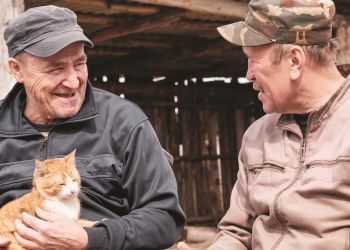Public Health Workforce Resilience Resource Library

In July of 2021, the Centers for Disease Control and Prevention (CDC) released results of a survey of more than 26,000 state, tribal, local, and territorial public health workers. That survey found that 53% of respondents reported symptoms of at least one mental health condition in the past two weeks, including depression (32%), anxiety (30%), PTSD (36%), or suicidal ideation (8%).
In May of 2022, U.S. Surgeon General Dr. Vivek Murthy issued a Surgeon General’s Advisory highlighting the urgent need to address the health worker burnout crisis across the country.
NACCHO appreciates the efforts of the public health workforce and is here to support your health and wellbeing. As such, we are providing the following resources to help public health workers build resilience.
In July 2022, NACCHO published the Joy in Work Toolkit. This an adapted version of the Institute for Healthcare Improvement (IHI) Framework for Improving Joy in Work, modified to meet the needs of local governmental public health workforce. In 2017, the IHI developed the IHI Framework for Improving Joy in Work as a tool for healthcare organizations to better understand barriers to joy in work that led to high rates of staff turnover and burnout and co-create strategies to address them. This toolkit includes an adapted version of the IHI’s “What Matters to You” Conversation Guide for leaders and an Action Guide adapted by NACCHO with strategies to promote joy in work. The Guide also teaches a conversation style that identifies barriers and supports for joy in work.
The Substance Abuse and Mental Health Services Administration (SAMHSA) Disaster Technical Assistance Center (DTAC) has developed a number of resources to help outreach workers and other disaster behavioral health professionals cope with stress and compassion fatigue associated with the COVID-19 pandemic. These resources are available in English and Spanish. Available resources include:
- Flyer: Are You Working to Help People Affected by the COVID-19 Pandemic? (English | Spanish)
- Wallet card: Tips for Managing Stress During the COVID-19 Pandemic (English | Spanish)
- Tips for Healthcare Professionals: Coping with Stress and Compassion Fatigue (English | Spanish)
- Tips for Survivors of a Pandemic: Managing Stress (English | Spanish)
- Tips for Survivors of a Disaster or Other Traumatic Event: Coping with Retraumatization (English | Spanish)
| Resource Name | Resource Link and Type | Description |
|---|---|---|
| Building Workforce Resilience through the Practice of Psychological First Aid: A Course for Leaders and Teams | Training available on TRAIN and NACCHO University | Training length: 2 hours Description: The course offers participants the opportunity to consider and pursue strategies for supporting colleagues and team members during a disaster response as stress levels increase for workers and the demands on your organization become more urgent. The goal of this course is to help individuals cope with stress at manageable levels, making it possible for them to effectively function and build resilience with each successive event they encounter. |
| “Upstream Approaches” to Build Resiliency: Organizational and Leadership Strategies | Video recording of a NACCHO Webinar on Zoom | Video length: 1 hour Description: This webinar explores workforce stressors and how organizations have been impacted by anxiety, brain fog, and burnout in workforce environments. Participants explore evidence-informed strategies and resources for organizations, teams, and leadership to build resilience in the workplace and explore communication strategies and methods to build team cohesion and healthy workplace culture. Additional Resources: PowerPoint slides with resource links |
| Finding HOPE through Crisis: Managing Stress and Supporting Optimism | Video recording of a Preparedness Summit session on YouTube | Video length: 1.5 hours Description: This session introduces HOPE, redefined as Honesty, Optimism, Professionalism, and Empathy. Each of these concepts can be applied and leveraged to help public health, healthcare, and emergency professionals navigate through sustained operational stress and stay resilient. Participants will learn strategies to harness stress in moments for performance, learn approaches to cultivate optimistic thinking and gratitude, and foster stronger connections with others to support general well-being as well as holistic performance. Additional Resources: Gratitude Calendar, Five Ways to Power Your Performance with Optimism |
| Organizational Resilience and Making Meaning: During COVID-19 and Beyond | Video recording of a workshop on YouTube | Video length: 1.5 hours Description: This virtual yet interactive workshop will examine current impacts of stressors within organizations and provide participants with concrete leadership and organizational activities and evidence-informed strategies that promote well-being and enhance workforce performance. Stressors explored through an organization approach will include burnout, compassion fatigue and complex grief. Participants will be provided tools and resources to reflect on their experiences, meet the current challenges, and make meaning as we move forward. |
| How Long Has Your “Check Engine” Light Been On? Enhancing Your Understanding of Yourself and Stress During COVID-19 | HHS ASPR webinar on YouTube | Video length: 1.5 hours Description: Understanding our own early warning signs of emotional trouble (like the check engine light in your car), our personal responses to adversity and the current state of our overall wellbeing are essential components of being able to help others cope and heal. However, compounded stressors related to the pandemic such as social distancing, facility surges, and limited resources have created challenges for recognizing these early signs of stress and have led to an increase in complex behavioral health risks, including compassion fatigue, caution fatigue, moral injury and complex grief. This virtual yet interactive workshop will examine current impacts of stressors and stress as influenced by the COVID-19 environment. The workshop will provide participants the opportunity for self-assessment and activities to encourage consideration of individual mitigation techniques that promote well-being and enhance professional performance. Participants will also be given a tool to help them anticipate and plan for how to address stress threats going forward to better prepare them to meet the challenges that lie ahead. |
| Promoting Resilience & Recovery from the Effects of the COVID-19 Pandemic | HHS ASPR webinar on GoToWebinar | Video length: 1.5 hours Description: This presentation is designed for social work professionals to strengthen their professional skill sets specifically to promote recovery from the COVID-19 pandemic. Experts in disaster human services, public health crisis response, and disaster behavioral health will share evidence-informed interventions for social workers to promote their own resilience, the resilience of individual clients, and the resilience of organizations and communities affected by disasters and public health emergencies. The presentation is relevant for social workers in behavioral health treatment, healthcare, schools, social services, and vulnerable population protective services, and emphasizes practical knowledge to empower social workers to be part of their community’s recovery. |
| It’s OK to Not be OK Right Now | HHS ASPR webinar on YouTube | Video length: 1 hour Description: In the first installment of ASPR's COVID-19 Recovery and Resilience speaker series, Scott Webb, discusses recent findings in trauma-informed care which have been featured in articles published by Wisconsin Center for Investigative Journalism and Isthmus. Mr. Webb, a trauma survivor who has worked in the behavioral health field for 35 years, provides an overview of trauma and secondary traumatic stress. He also discusses communication, self-care, boundaries, and other important topics to help promote behavioral health for healthcare providers. |
| Stress First Aid for the Health Care Workforce | HHS ASPR webinar on YouTube | Video length: 1 hour Description: Stress First Aid is a model used to improve recovery from stress reactions in yourself and others. Dr. Richard Westphal, a dual board-certified advance practice mental health nurse and nurse practitioner and Co-Director of the Wisdom and Wellbeing Program within UVA Health, provides an overview of Stress First Aid and explains how the concept can help your organization support your staff more effectively during disasters and emergencies. |
NACCHO will be adding additional resources to this page as they become available. Please check back or subscribe to the Preparedness Brief for updates via email.








